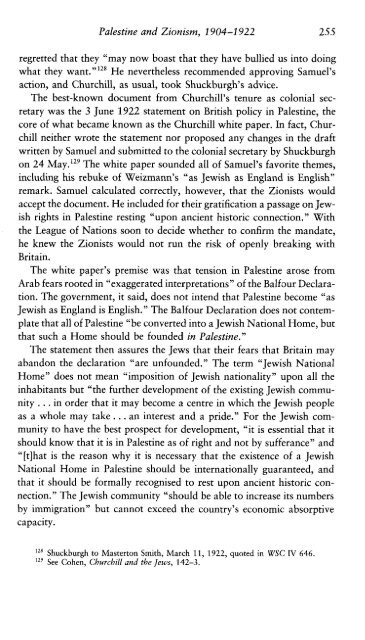Churchill, Palestine and Zionism, 1904-1922 - Douglas J. Feith
Churchill, Palestine and Zionism, 1904-1922 - Douglas J. Feith
Churchill, Palestine and Zionism, 1904-1922 - Douglas J. Feith
You also want an ePaper? Increase the reach of your titles
YUMPU automatically turns print PDFs into web optimized ePapers that Google loves.
<strong>Palestine</strong> <strong>and</strong> <strong>Zionism</strong>, <strong>1904</strong>-<strong>1922</strong> 255<br />
regretted that they "may now boast that they have bullied us into doing<br />
what they want.,,128 He nevertheless recommended approving Samuel's<br />
action, <strong>and</strong> <strong>Churchill</strong>, as usual, took Shuckburgh's advice.<br />
The best-known document from <strong>Churchill</strong>'s tenure as colonial secretary<br />
was the 3 June <strong>1922</strong> statement on British policy in <strong>Palestine</strong>, the<br />
core of what became known as the <strong>Churchill</strong> white paper. In fact, <strong>Churchill</strong><br />
neither wrote the statement nor proposed any changes in the draft<br />
written by Samuel <strong>and</strong> submitted to the colonial secretary by Shuck burgh<br />
on 24 May.129 The white paper sounded all of Samuel's favorite themes,<br />
including his rebuke of Weizmann's "as Jewish as Engl<strong>and</strong> is English"<br />
remark. Samuel calculated correctly, however, that the Zionists would<br />
accept the document. He included for their gratification a passage on Jewish<br />
rights in <strong>Palestine</strong> resting "upon ancient historic connection." With<br />
the League of Nations soon to decide whether to confirm the m<strong>and</strong>ate,<br />
he knew the Zionists would not run the risk of openly breaking with<br />
Britain.<br />
The white paper's premise was that tension in <strong>Palestine</strong> arose from<br />
Arab fears rooted in "exaggerated interpretations" of the Balfour Declaration.<br />
The government, it said, does not intend that <strong>Palestine</strong> become "as<br />
Jewish as Engl<strong>and</strong> is English." The Balfour Declaration does not contemplate<br />
that all of <strong>Palestine</strong> "be converted into a Jewish National Home, but<br />
that such a Home should be founded in <strong>Palestine</strong>."<br />
The statement then assures the Jews that their fears that Britain may<br />
ab<strong>and</strong>on the declaration "are unfounded." The term "Jewish National<br />
Home" does not mean "imposition of Jewish nationality" upon all the<br />
inhabitants but "the further development of the existing Jewish community<br />
... in order that it may become a centre in which the Jewish people<br />
as a whole may take ... an interest <strong>and</strong> a pride." For the Jewish community<br />
to have the best prospect for development, "it is essential that it<br />
should know that it is in <strong>Palestine</strong> as of right <strong>and</strong> not by sufferance" <strong>and</strong><br />
"[t]hat is the reason why it is necessary that the existence of a Jewish<br />
National Home in <strong>Palestine</strong> should be internationally guaranteed, <strong>and</strong><br />
that it should be formally recognised to rest upon ancient historic connection."<br />
The Jewish community "should be able to increase its numbers<br />
by immigration" but cannot exceed the country's economic absorptive<br />
capacity.<br />
128 Shuckburgh to Masterton Smith, March 11, <strong>1922</strong>, quoted in WSC IV 646.<br />
129 See Cohen, <strong>Churchill</strong> <strong>and</strong> the Jews, 142-3.


